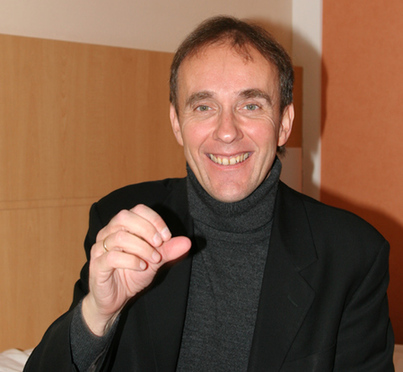Article by Till Woehler - translated by David Ferguson
 Adrian Geiges is a journalist and author. The former career revolutionary once ran a major media business in China.
Adrian Geiges is a journalist and author. The former career revolutionary once ran a major media business in China.
China.org.cn: Herr Geiges, how long have you been in China?
Adrian Geiges: In total, ten years. A year in Hong Kong, three in Shanghai, and the rest of the time in Beijing. But please let us use "du" (informal) rather than "Sie".
China.org.cn: Fine. So where did your particular interest in China spring from?
AG: Well, it all started when I read Mao's "Little Red Book" when I was twelve years old, in West Germany. I am of the sixties generation (1960s), and like many of my contemporaries I was of the political far left. When Mao met with Nixon I was profoundly disappointed, and decided to follow the Moscow path of communism. At the age of 16 I was already a member of the DKP (German Communist Party). I was very active, and by 18 I was invited to become a Party Cadre. "We are going to speak about things that you may not tell anyone – not even your parents," I was told. "We want to send you abroad for further training in socialism."
And so I left West Germany (BRD) for a Cadre Training Center in East Germany (DDR). At the time this was like an American going to an Al Qu’aida training camp (laughs). The DDR came as a profound culture shock to me, as much of the reality was profoundly different to the ideals that we had in our heads.
What kind of school was it, and what did you learn there?
It was the Wilhelm Pieck Youth High School near Berlin. The top training center for the FDJ ("Free German Youth" – youth branch of the ruling party). A castle, hidden deep in the woods. Young activists from all over the world were trained there – Sandinistas from Nicaragua, Vietnamese, youth from the PLO and from the ANC in South Africa, as I also describe in my book "How the global revolution began in the Black Forest."
There were many decent young people there who shared similar views to my own and who also found that the reality of Socialism was a long way from the ideal. For example the tedious official jargon of the reports in the Party Newspaper "Neues Deutschland" (New Germany), similar to what one sometimes finds in China: turgid accounts of how the great Erick Honecker had shaken so-and-so by the hand and suchlike. We had high hopes of bringing about real reform, when "the young generation" would get hold of the rudder. We were great idealists, and saw ourselves as part of a worldwide movement that would shape a new and better world.
Then you returned to West Germany?
Following my return to the West I saw myself as a career revolutionary. I worked only for the Party. I was international Editor of "Ela", the youth journal of the DKP, and as a result I travelled extensively around the world.
Including China?
Yes. That was a kind of brief interlude. In the middle of the 1980s, when relations between Communist Parties around the world had improved, I thought to myself "this is the chance for me to get to know Communist China". However, as a young DKP Cadre one could not simply head off to China at one's own initiative. The Party had to approve. I was therefore invited to attend the DKP Politburo. At the time my prospects didn't look too good, as there had been no exchanges with the Chinese Communist Party for two decades. But the DKP leadership was once more ready to accept an invitation to Beijing. So the signs were encouraging. Eventually the Leadership announced to me: The Party has decided – you are to be our "green shoot".
The diplomatic exchanges between the Parties were frighteningly complicated, but I had the good fortune not to be too much of a high-up. That's what got me through at the end of the day. I was only in the DKP Youth Branch, and I worked as a journalist for our journal. That was 1986, and the trip lasted six weeks – very stimulating.
Then along came Gorbachev with his Glasnost and his Perestroika. You have to put yourself into the position of a DKP functionary of the period: all of a sudden the head of half of the communist states in the world utters the very same doubts as we had voiced as young activists. Standard practice in the DKP was to treat everything coming out of Moscow, as with East Berlin, as a "good thing". Gorbachev's words caused some conflict among us because suddenly the "Pope" and his "Archbishop" were saying two entirely different things.
I was always an original thinker. In my experience – it doesn't matter whether you are talking about a company, a Political party, or a country – you will always find two basic types: the original thinker and the follower. These latter in my latest book I have termed "Dogs". "Dog" as a surname, "dog" as an informer, born in the Chinese year of the dog – people who always support what the bosses say. Perhaps not in their heart of hearts, but it is often more comfortable to create this outward impression. I wanted to change everything, and in the course of this process I was eventually led to quit the DKP.